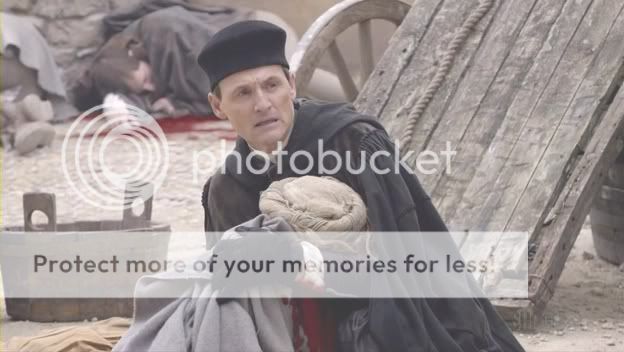The latest installment of Showtime's period piece saw many advances for the Borgia clan, one quite literally. As French troops led by King Charles and petitioned by Cardinal Della Rovere press deeper into Italy, Pope Alexander VI, all of Rome, as well as the viewer, is wondering how long it will be until war is at their doorstep. Well, at least those of us who didn't study up on fifteenth century papal history are.
In the beginning it seemed like the writers were going to again focus on the romance subplots, which took up much of the last episode, luckily that wasn't the case and they were wrapped up quickly so the French invasion could take center stage. When done right romance can be as compelling as political intrigue, but in the case of The Borgias they seem to distract more than add to the story or the characters' depth. It was also wise to let Juan fall back out of the spotlight as his performances haven't wowed. He's good for a little comic relief but that's it; his affair with his younger brother's newly betrothed failed to garner interest. And while Cesare and Lucrezia were dealing with matters of the heart, their attentions were quickly redirected on what impact the French army would have on the razor's edge upon which their family already walks. Their conversation before Lucrezia returned to Pesaro was excellent, as they always are, the actors' chemistry elevating what is written on the page. The somber tone of their talk made it even better than their previous lighthearted chats and helped reinforce how much Lucrezia is maturing in such a short time, and how dark the days have become for the House of Borgia. Though it does make one wonder if Neil Jordan plans to take their relationship down the dark path that rumors suggested it went. In a series that seems to be based more on historic rumor than on fact, it seems likely.
Cardinal Della Rovere's struggle to remove Borgia, while not sacrificing his homeland to do it, has made for an engrossing storyline and an endearing character, especially since it seems he's losing in that struggle. After witnessing first hand the destructive power of the beast he has unleashed, Della Rovere is desperate to limit their destruction. It's easy to see why after King Charles and his army use Lucca to set an example for the rest of Italy, slaughtering soldier and civilian alike, the French make a “grisly”(as King Charlie himself would call it) first impression. The fighting could have been choreographed better, but the choice to have Savonarola's omen of the “Cleric in Red” dubbed over the aftermath was a good choice and brought home the fact that Della Rovere bit off much more than he could chew by beseeching the French.

Though
the action was a nice change of pace, the drama was still the
highlight of the episode. As Rodrigo becomes more concerned over the
French hordes cutting their way into Italy, he grows more desperate
and in that desperation shows weakness in front of the entire College
of Cardinals. It was intriguing to see the man who is always
confident and in control practically raving for an excommunication of
all of Florence. The look on Cesare's face was a reflection of how
the viewer felt; shocked to see Rodrigo flounder in front of so many
men that would jump on any advantage he might give them to see this
Spanish pope uncrowned. This breakdown leads to Rodrigo questioning
whether he was meant to be pope at all as he unburdens his soul in
confession. The fact that he can still believe God ordained his path
to the papacy, even knowing how he bribed his way into the crown and
killed to keep it, is what defines Rodrigo's character. An ability
to convince himself that he is still righteous in his actions,
whether it's God's will that commands them or will be God's
forgiveness that absolves them. As delusional perhaps as Della
Rovere was about using France to remove Borgia from power, and with
consequences just as dire for some.
Giulia Farnese's scene with the Sforzas in Pesaro, while performed well enough, didn't add anything to the plot, rather just reiterating what Giovanni had already told Lucrezia; the Sforza's would not be lending the Borgia's any aid against France. Her scene with Lucrezia was more necessary but also drug out, as anyone watching guessed that the young Borgia was pregnant a few seconds in to it. Those scenes and the love/lust plots kept the episode from truly shining, but weren't enough to bring down the main storyline.
There is still a sense of melodrama that's prevalent in most of Showtime's original series, but even if it's not elevating the genre, The Borgias is still entertaining enough to keep watching. The dialogue has remained solid and at some points it can be excellent; Cesare's conversation with Lucrezia and Savonarola's mad rants being two fine examples. Same can be said for the actors' performances, with one or two exceptions. So while it is a primetime soap opera, it's a well made one that keeps the viewer wanting more. Despite a few scenes falling short, Death on a Pale Horse was no exception.